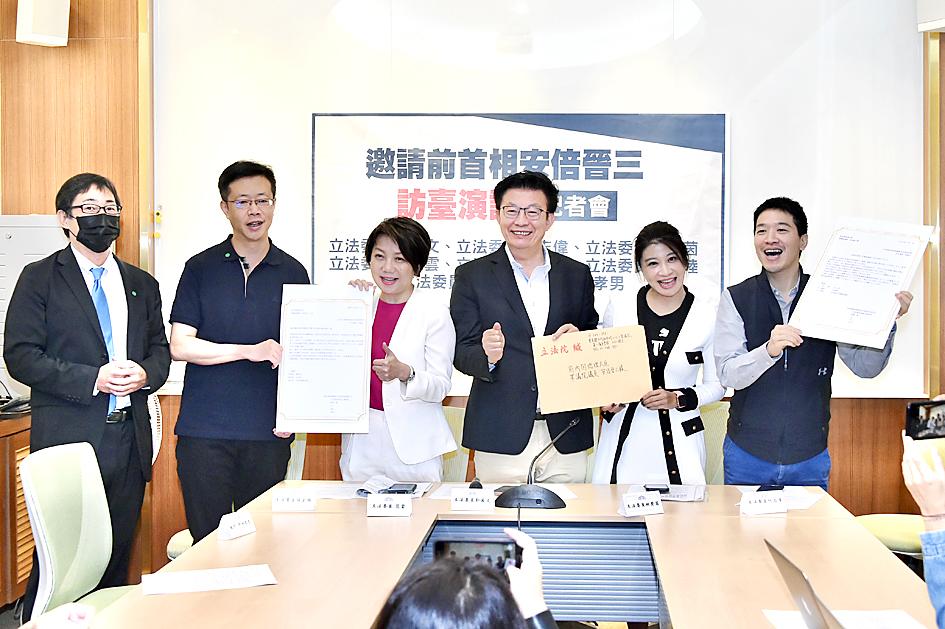The Legislative Yuan’s parliamentary friendship association for the East Asian region yesterday announced that it is officially inviting former Japanese prime minister Shinzo Abe to visit Taiwan next year.
The group held a news conference and presented copies of a letter of invitation for Abe to give a speech at the Legislative Yuan in Taipei.
Next year would be a momentous occasion for Japan, with the nation marking the 10th anniversary of the 2011 Fukushima Dai-ichi nuclear power plant disaster, as well as the proposed staging of the delayed Summer Olympic and Paralympic games, it said.

Photo: Tu Chien-jung, Taipei Times
The letter cited the strong friendship between Taiwan and Japan, and how the two countries have aided each other in times of need.
Democratic Progressive Party (DPP) Legislator Kuo Kuo-wen (郭國文), head of the association, said he believed that next year would be the best time to invite Abe, as he would have had time to recuperate after stepping down as prime minister due to health reasons.
Abe had made it possible for former president Lee Teng-hui (李登輝) to visit and address the Japanese Diet on his views on democracy and other academic topics, DPP Legislator Michelle Lin (林楚茵) said.
The Legislative Yuan, as a representative of Taiwan’s citizenry, is the best proxy in expressing its friendship to other countries, DPP Legislator Fan Yun (范雲) said.
Abe is seen as a political figure who has been most friendly toward Taiwan and the invitation could pave the way for even closer relations between the two nations, she said.
Taiwan and Japan enjoy very friendly non-government relations and a visit by Abe would boost bilateral relations, which is especially heartening as Taiwan is faced with an unfriendly neighbor, DPP Legislator Chang Hung-lu (張宏陸) said.
Chang said he hoped that in the future, high-level government officials from Taiwan and Japan would be able to visit each other.
Ministry of Foreign Affairs spokeswoman Joanne Ou (歐江安) said the ministry would like to thank the association for its contributions to furthering Taiwan-Japan relations.
Abe had on multiple occasions expressed that Taiwan and Japan have shared values, and that Taiwan is a “cherished friend and partner,” she said.
Under Abe, the Japanese government was amenable to Taiwan joining the Comprehensive and Progressive Agreement for Trans-Pacific Partnership and other international bodies, such as the WHO, she added.
The ministry will continue to deepen relations with Japan, while stepping up efforts to enhance ties with Abe and other Japanese officials, Ou said.
Additional reporting by Lu Yi-hsuan

MAKING WAVES: China’s maritime militia could become a nontraditional threat in war, clogging up shipping lanes to prevent US or Japanese intervention, a report said About 1,900 Chinese ships flying flags of convenience and fishing vessels that participated in China’s military exercises around Taiwan last month and in January have been listed for monitoring, Coast Guard Administration (CGA) Deputy Director-General Hsieh Ching-chin (謝慶欽) said yesterday. Following amendments to the Commercial Port Act (商港法) and the Law of Ships (船舶法) last month, the CGA can designate possible berthing areas or deny ports of call for vessels suspected of loitering around areas where undersea cables can be accessed, Oceans Affairs Council Minister Kuan Bi-ling (管碧玲) said. The list of suspected ships, originally 300, had risen to about 1,900 as

Japan’s strategic alliance with the US would collapse if Tokyo were to turn away from a conflict in Taiwan, Japanese Prime Minister Sanae Takaichi said yesterday, but distanced herself from previous comments that suggested a possible military response in such an event. Takaichi expressed her latest views on a nationally broadcast TV program late on Monday, where an opposition party leader criticized her for igniting tensions with China with the earlier remarks. Ties between Japan and China have sunk to the worst level in years after Takaichi said in November that a hypothetical Chinese attack on Taiwan could bring about a Japanese

Right-wing political scientist Laura Fernandez on Sunday won Costa Rica’s presidential election by a landslide, after promising to crack down on rising violence linked to the cocaine trade. Fernandez’s nearest rival, economist Alvaro Ramos, conceded defeat as results showed the ruling party far exceeding the threshold of 40 percent needed to avoid a runoff. With 94 percent of polling stations counted, the political heir of outgoing Costa Rican President Rodrigo Chaves had captured 48.3 percent of the vote compared with Ramos’ 33.4 percent, the Supreme Electoral Tribunal said. As soon as the first results were announced, members of Fernandez’s Sovereign People’s Party

MORE RESPONSIBILITY: Draftees would be expected to fight alongside professional soldiers, likely requiring the transformation of some training brigades into combat units The armed forces are to start incorporating new conscripts into combined arms brigades this year to enhance combat readiness, the Executive Yuan’s latest policy report said. The new policy would affect Taiwanese men entering the military for their compulsory service, which was extended to one year under reforms by then-president Tsai Ing-wen (蔡英文) in 2022. The conscripts would be trained to operate machine guns, uncrewed aerial vehicles, anti-tank guided missile launchers and Stinger air defense systems, the report said, adding that the basic training would be lengthened to eight weeks. After basic training, conscripts would be sorted into infantry battalions that would take